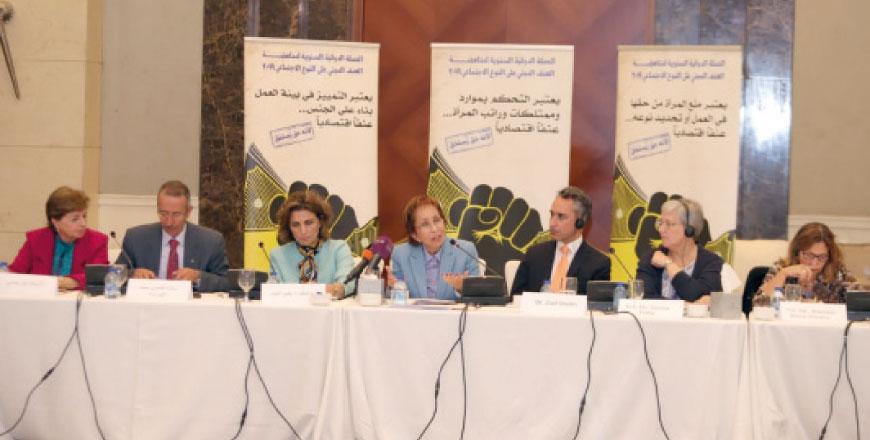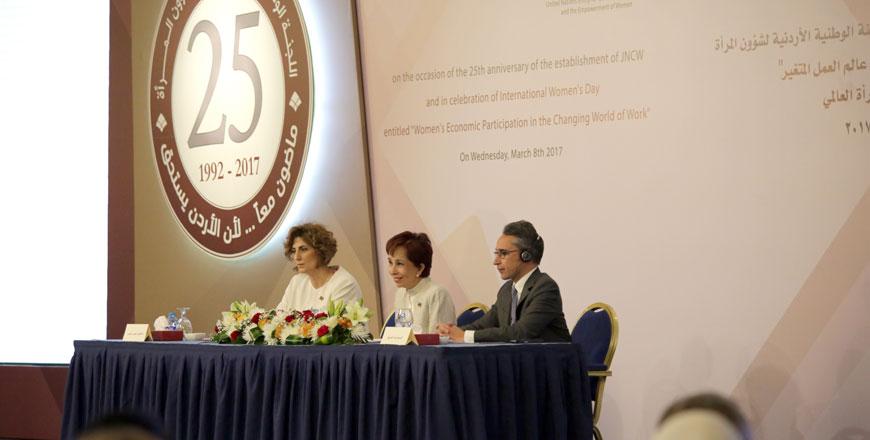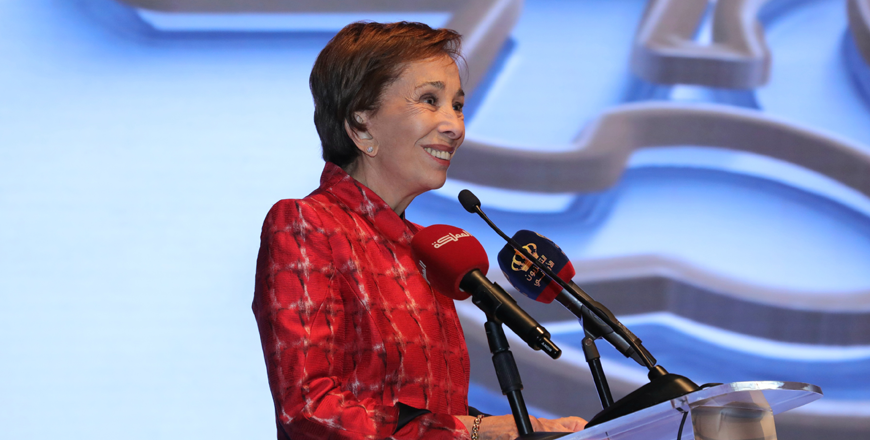You are here
Princess Basma urges measures to counter economic discrimination against women
By Rana Husseini - Dec 05,2019 - Last updated at Dec 06,2019

Princess Basma speaks at a round-table discussion titled ‘Break the Silence on Economic Violence’, organised by the Jordanian National Commission for Women, on Wednesday (Petra photo)
AMMAN — HRH Princess Basma on Wednesday called on all concerned parties in the Kingdom to exert more efforts to end economic violence against women.
“There needs to be a serious examination by the government of all the laws that still discriminate against women in general and those related to women’s economic empowerment,” Princess Basma said.
The princess added that there also needs to be constant awareness-raising and educational campaigns targetting women to keep them up-to-date on their labour and economic rights.
“It is extremely important to coordinate the work among all the relevant organisations and institutes to support women and safeguard their rights by working to change the wrongful stereotypical images about their rights, which are granted by the Constitution and all religions,” Princess Basma added.
She pointed out that one problem concerns women and inheritance, “as some women are forced to waive their rights of inheritance”, adding that only six per cent of Jordanian women own land.
The princess was addressing women activists, MPs, unions members, experts, religious figures and leaders from various governmental and non-governmental organisations during a round-table discussion titled “Break the Silence on Economic Violence”, organised by the Jordanian National Commission for Women (JNCW) as part of the 16 Days of Activism against Gender-based Violence campaign.
The topics of the three-hour events focused on economic violence against women within the household and the working environment, which could result in women’s economic marginalisation or affect her economic participation in the labour market or the their low salaries, JNCW Secretary General Salma Nims said.
“Women are also sometimes forced to give up their inheritance rights or properties they own or are driven by their husbands and other family members to take bank loans that they cannot commit to at a later stage in their lives,” Nims told the gathering.
In addition, the JNCW secretary general added that women are also suffering from various types of discrimination at work, including being deprived of their right to work in an appropriate environment and enroll in the Social Security Corporation, among other things.
“We are constantly working to raise awareness with our partners about the negative consequences of economic violence against women, and are drafting strategies to address this problem based on a study that was conducted on this topic,” Nims told the gathering.
The study, which was conducted by the JNCW and the University of Jordan’s Centre for Strategic Studies and targetted 2,000 women over 18, indicated that only 33 per cent of those surveyed believe they are being paid fairly and based on their years of experience and qualifications.
Forty per cent of working women are forced to spend part of their salaries on their families, according to the study.
Almost 16 per cent of those surveyed said they have “no authority or control” over their properties, while around 15 per cent of the women said they had been forced to take a bank loan or pay for a loan taken by another family member.
Also speaking at the event was Gender Technical Specialist with the International Labour Organisation (ILO) Reem Aslan, who said that ILO studies show that “women want to work, but some of their unpaid work holds them back”.
“Social norms reinforce the roles of women as caregivers and men as breadwinners. Caregiving must be addressed in an intentional and meaningful way for both men and women through laws, policies and services,” Aslan said.
Some of the solutions that can guarantee decent work conditions for women, Aslan added, include digital payments of wages for all sectors (formal and informal).
The National Committee for Pay Equity has adopted this solution under their work plan, as it will not only provide wage protection to women’s (and men’s) wages but will also allow monitoring women’s coverage in social security, increase female financial inclusion and facilitate data analysis of the gender pay gap, Aslan added.
Other important solutions include the adoption of a policy that protects women and men from violence and harassment in the world of work, flexi-work arrangements that can allow persons with family responsibilities to continue to work and measures for paternity and maternity leave, among others, according to Aslan.
Also addressing the gathering was Lamia Bishawi, director of the Agriculture Workers Union. She highlighted the plight of thousands of female workers in the Jordan Valley.
“We get low salaries and many of us are subjected to harsh working environments by being exposed to pesticides with no proper medical attention or intervention,” Bishawi said.
She added that women are also subjected to all forms of violence, including sexual harassment, while working, but they “stay quiet in order to be able to feed their children with the little salaries they receive”.
Activist and finance expert Yara Katami also noted that many women are “misinformed by financial institutions that offer them loans, and they end up in trouble”.
“Financial institutes need to always make sure that women who are seeking loans have enough banking resources to help them pay their debts in the event of an emergency or a certain problem,” Katami said.
Meanwhile, Al Ghad journalist Rania Sarayreh said there is a need to ensure that women journalists are assuming high, leading position in their institutions.
“We have our own problems in our institutions, including discrimination in salaries and lack of interest by our superiors in women’s topics,” Sarayreh said.
The JNCW’s 16-day campaign is being supported by the United Nations, Hivos People Unlimited, European Institute for gender Equality, the European Regional Development and Protection Programme and Al Ghad newspaper.
Related Articles
By AMMAN — The Jordanian National Commission for Women (JNCW) on Wednesday celebrated International Women’s Day, which coincided
AMMAN — Her Royal Highness Princess Basma Bint Talal, Honorary Goodwill Ambassador for the UN Women and Chairperson of the Jordanian Nationa
AMMAN — HRH Princess Basma on Wednesday called for the expansion of knowledge and capabilities, creating broader platforms for women’s voice

















